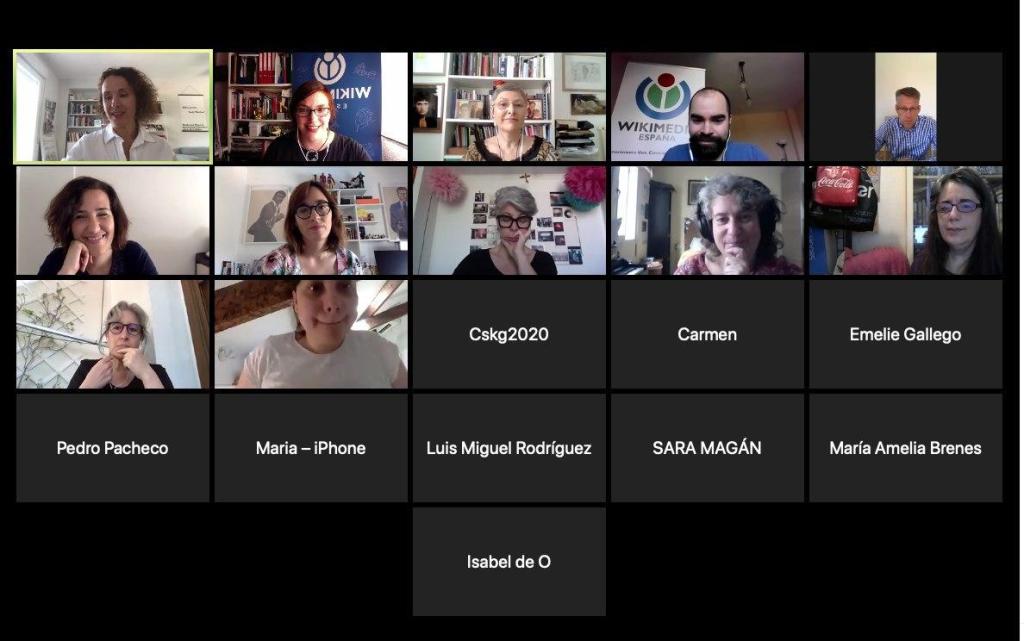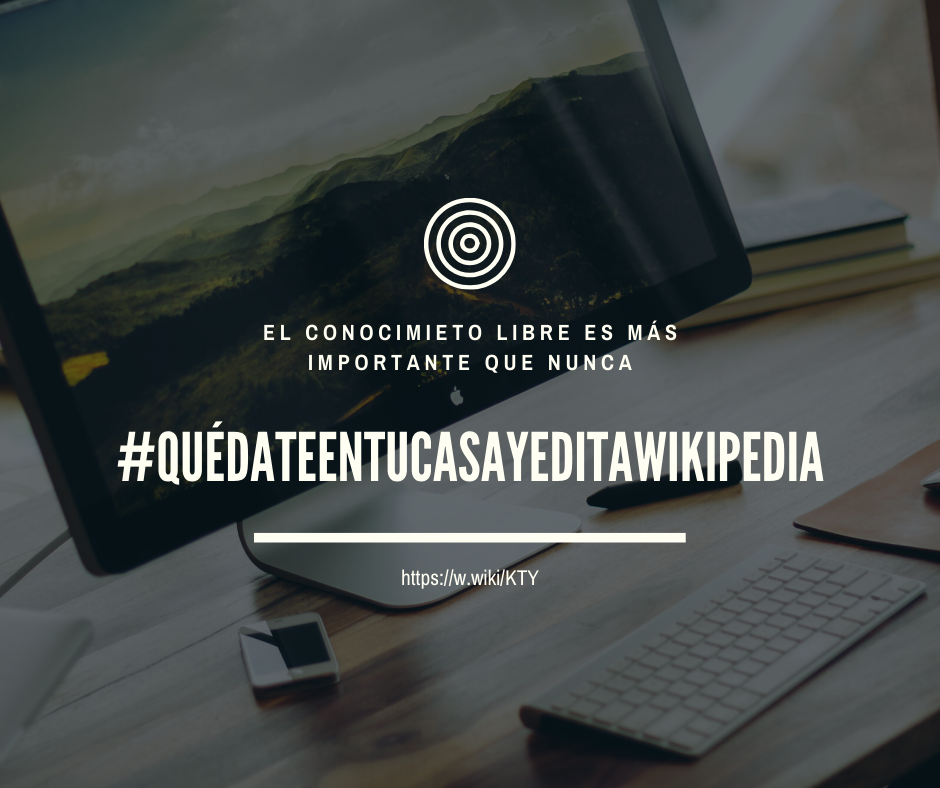Background
On March 14, the Spanish government decreed the entry into force of the state of alarm throughout the country. This measure limited the free movement of citizens, which in practice resulted in the confinement of the population to their homes. A few days earlier, on March 9, the Ministry of Health and the regional governments agreed on a series of measures in response to the coronavirus disease pandemic; these measures included the recommendation of teleworking and the suspension of in-person activities, for example in the field of education.
Following these recommendations, on March 9 we decided to postpone the WikiGap editathon, which was to be held the next day at the Swedish Embassy in Madrid, and since then our staff has been working from home. In view of this situation, on March 13 we made public the cancellation of all our in-person activities until further notice, in line with the measures taken from the Wikimedia Foundation, and that same day we launched the QuédateEnTuCasaYEditaWikipedia (StayAtHomeAndEditWikipedia) campaign.
Planning and development
The campaign sought to provide, in the context of confinement, a motivation to collaborate with Wikimedia projects, whether experienced or new editors, and a response to the cancellation of our in-person activities. Thus, during these three months (the state of alarm ended on June 21) a set of actions were proposed, some of which were already part of the annual planning of Wikimedia Spain, others arose specifically because of the confinement, and others were organized by other communities. Some were included by the board or staff, while others were proposed by volunteers.

First, in relation to Wikidata, our member Ángel Obregón uploaded the database of hospitals in Spain, as a way to offer that knowledge freely, with even more interest in the context of the pandemic, and the community was asked to participate in correcting any data that was wrong or incomplete and in searching for coordinates in cases where they did not have any. These tasks generated intense activity in our internal channels and also motivated the creation of several articles on hospitals in Wikipedia.
In relation to the Wikimedia Commons, it was proposed to document, through photographs, aspects related to the pandemic and confinement, from security controls to empty streets. The images, published under a free license, are available in this Wikimedia Commons Category. It was also recalled the possibility of continuing to upload files of ballot papers, from the past general elections of 2019, or photographs of municipalities without pictures, within our permanently active campaign to document the rural heritage. Likewise, the recording of audios through the Lingua Libre tool or the reading of articles was encouraged.
Around Wikipedia, a set of activities already programmed by Wikimedia Spain and other groups such as Wikimedia Argentina, Wikimedia Chile, Wikimedia Mexico and Wikimedia Sweden. Among them, the contest Qué sería de nosotras sin ellas and the WikiGap Challenge, focused on reducing the gender gap in Wikipedia, the International Tapir Day editathon, and editing challenges on natural areas, museums, the African Month (organized for the first time in Spanish Wikipedia with the aim of increasing content on this continent) and the PESCAR contest, on the history of humanity.
Among the new proposals are Wikimuseum, in relation to the creation of articles on works of art, the edition on sports clubs, generally of minority sports, and several editathons, such as those celebrated around the International Day For Monuments and Sites, the World Book Day, and the Olympic Day.
Finally, Wikimedia Spain proposed a series of online sessions, both internal and open to the public, with the aim of publicizing some of the Wikimedia projects, tools, initiatives and other aspects that encourage participation and collaborative work for free knowledge. The first was held on April 8 and the last on July 21, for a total of 28 meetings. For the organization of these sessions, proposals from the Wikimedia Spain board and staff as well as from members were taken into account, and both volunteers (12 sessions) and board members and staff (16 sessions) participated as speakers, so the participation and involvement of volunteers was taken into account throughout the process. One of these sessions was also dedicated to staff from GLAM institutions.

Results
On a general level, we consider the results of this initiative to be very good. Not only has an important volume of content been generated, but our community has had reasons and possibilities to actively participate, which was one of our objectives given the cancellation of all our in-person activities.
In order to follow up the campaign, a hashtag was proposed, and as of August 5, 4,109 editions are registered in 1584 pages, with the participation of 31 people in 10 projects. Regarding the online training and dissemination sessions, a total of 646 people participated (more than 60 people attended the session dedicated exclusively to personnel from GLAM institutions), with an average of 23 people per session.
These good results and the positive feedback we have received in these months encourage us to consider, for example, that the option of online sessions be something permanent from now on, perhaps not with the pace and intensity we have had (with weeks in which there were up to three sessions) but with a certain regularity, given the interest and good response of the community to this online training, a field we had not explored until now.

Can you help us translate this article?
In order for this article to reach as many people as possible we would like your help. Can you translate this article to get the message out?
Start translation